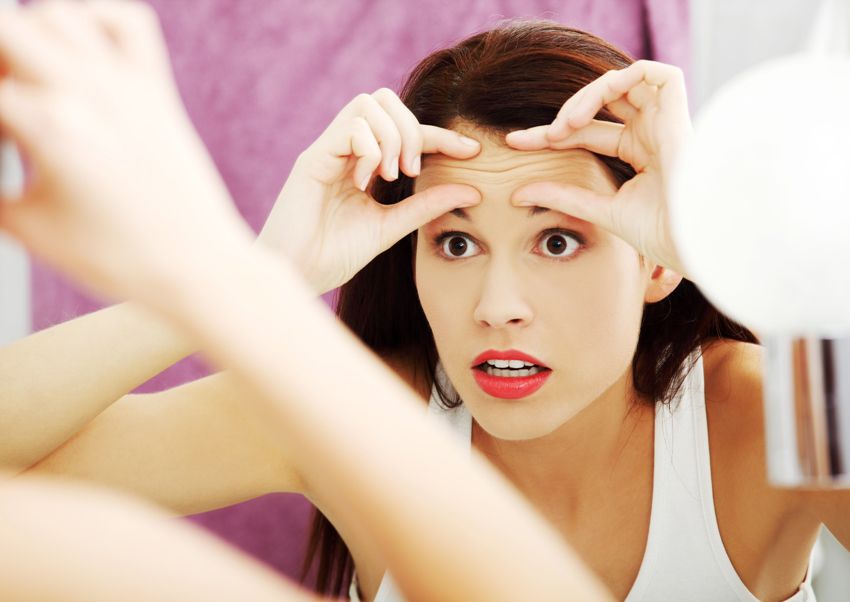
There is just no getting around it—with the holidays comes stress. During the time when we want our skin to glow brighter than the lights on our Christmas tree we’re bogged down with family arguments, last-minute shopping, delayed travel plans, burnt turkeys and a million other things that could go wrong. The holidays are one big study in Murphy’s Law. And it takes its toll on our skin in some of the worst ways. A recent study by the ladies over at Elizabeth Arden and Wakefield Research showed that our physiological stress can negatively affect our skin and “breakdown in the epidermal barrier function.” Which means those arguments with your Aunt Debbie about your new haircut are actually contributing to wrinkles, a lackluster complexion and skin diseases—suddenly we’re thinking it might be easier to just put a hat on it.

The survey was conducted on 1,000 U.S. women between the ages of 18-40 to assess not only their stress levels but how each generation dealt with and reacted to this stress. Researches also discovered how each generation dealt with skincare and what their specific needs and concerns are. Out of the 1,000 women surveyed 58% said that they felt more stressed than they believed their parents were at their age citing finances, family, career and appearance as the top stressors. And while the study shows women are using exercise, shopping, friends and sex as a way to combat stress, most women—a whopping 92 percent—believe that all of that stress is having a negative effect on their appearance.

Millennial women are especially averse to aging with a majority of them believing it would be better to gain 10 pounds than to look 10 years older (and we all know the crazy hoops we’ll jump through to lose weight), with most wanting to look an average of 24 their whole lives. While no one is going to be able to stay 24 forever (short of having a fairy godmother), with a clear understanding of how stress can affect our skin we’re better able to combat signs of aging and take steps to slow or prevent the deterioration of our biggest beauty asset. To address stress-related skin concerns for women who are showing the first signs of aging, Elizabeth Arden created the Flawless Future collection, a four-piece collection that uses Ceramide to "intercept early aging signs" by protecting, smoothing and moisturizing the skin. We spoke with the brand's consulting dermatologist, Joely Kaufman, M.D. F.A.A.D. Board Certified dermatologist and active member of the American Academy of Dermatology to find out her recommended skincare regimen, what stressors to watch out for and how permanent this damage truly is.

JustLuxe: Can you talk a bit about additional ways stress actually impacts our skin? How quickly can these affects take place? Are they long term?
Joely Kaufman: Stress causes an increase in inflammation and free radicals in the entire body, including the skin. The compromise to the epidermal barrier, seen in stressed patients, exacerbates this problem. These problems can be reversed, but many women of this younger age group don’t know they exist, so we aren’t treating them appropriately.
JL: What are some things women need to be mindful of when they’re trying to improve their skin as it pertains to both skincare and their lifestyle?
JK: The most important thing to remember, in my opinion, is that skincare is not only skin deep. The skin is the window to the rest of the body and all of what we put into the body also affects the skin. Our diet, water intake, stress levels, hormones, amount of sleep, general health and environmental exposures all have an impact on our skin.

JL: Can you tell us your recommended skin care regimen? What are the best steps to better skin?
JK: I design a skincare regimen based on the age of the skin. In many cases the age of the skin is not the same as the patient’s chronologic age. For those who have lived a life in the sun, like in Miami, the skin may be older and more damaged than the patient’s age. Each skin age group will have a very different regimen, with the very young and undamaged skin focusing on a preventative regimen, while older skincare is centered around a restorative regime.
JL: As a dermatologist are you starting to see an increase of younger women with stress-related skin concerns?
JK: Stress exacerbates many skin conditions. So it is not only what stress can do alone, but what stress can do to intensify other skin problems, such as dryness, acne, rosacea, hair loss, eczema…the list is almost endless.
JL: What are the first areas that begin to show signs of aging?
JK: For fair skin patients, the first noticeable changes are generally around the eyes, with fine lines “crow’s feet” and fine lines on the forehead. However, the process begins far before the appearance of the lines.

JL: Do you think this intense focus on aging concerns with millennials is a new phenomenon or has this been something that’s been around for a while?
JK:The focus on aging has advanced significantly over the last decade. With this advancement we have seen an emphasis not only on treatment of aging, but also on prevention. Prevention is now starting at a younger age. Our scientific understanding of the causes of aging are continuing to progress and this has allowed for more sophisticated products. Since the millennial age group of women don’t have many lines yet, their concerns about wrinkles are different than those in the other age groups. These women still want to look their best, but really should be focusing on prevention of future aging and maintenance of the skin that they have.









